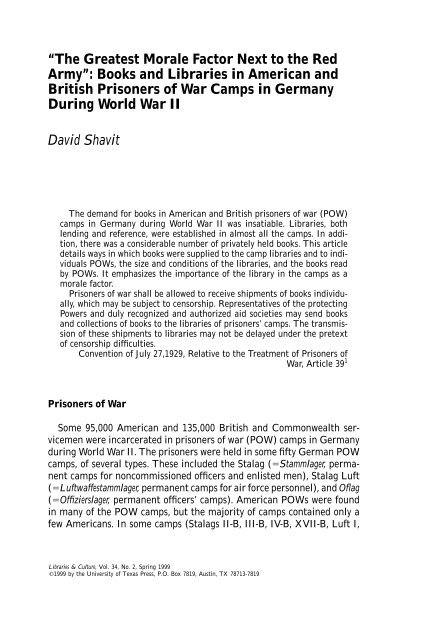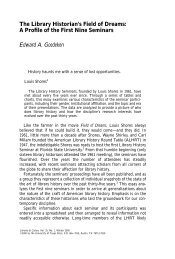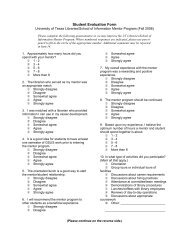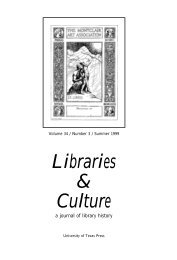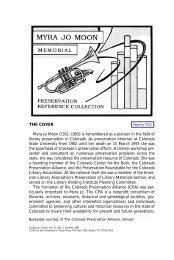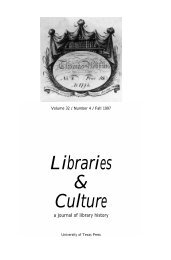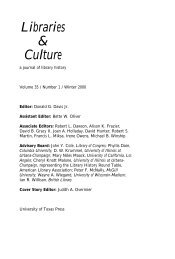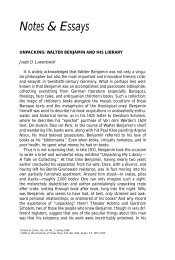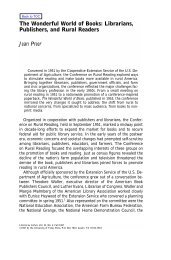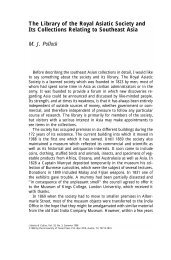“The Greatest Morale Factor Next to the Red Army”: Books and ...
“The Greatest Morale Factor Next to the Red Army”: Books and ...
“The Greatest Morale Factor Next to the Red Army”: Books and ...
You also want an ePaper? Increase the reach of your titles
YUMPU automatically turns print PDFs into web optimized ePapers that Google loves.
<strong>“The</strong> <strong>Greatest</strong> <strong>Morale</strong> <strong>Fac<strong>to</strong>r</strong> <strong>Next</strong> <strong>to</strong> <strong>the</strong> <strong>Red</strong><br />
<strong>Army”</strong>: <strong>Books</strong> <strong>and</strong> Libraries in American <strong>and</strong><br />
British Prisoners of War Camps in Germany<br />
During World War II<br />
David Shavit<br />
The dem<strong>and</strong> for books in American <strong>and</strong> British prisoners of war (POW)<br />
camps in Germany during World War II was insatiable. Libraries, both<br />
lending <strong>and</strong> reference, were established in almost all <strong>the</strong> camps. In addition,<br />
<strong>the</strong>re was a considerable number of privately held books. This article<br />
details ways in which books were supplied <strong>to</strong> <strong>the</strong> camp libraries <strong>and</strong> <strong>to</strong> individuals<br />
POWs, <strong>the</strong> size <strong>and</strong> conditions of <strong>the</strong> libraries, <strong>and</strong> <strong>the</strong> books read<br />
by POWs. It emphasizes <strong>the</strong> importance of <strong>the</strong> library in <strong>the</strong> camps as a<br />
morale fac<strong>to</strong>r.<br />
Prisoners of war shall be allowed <strong>to</strong> receive shipments of books individually,<br />
which may be subject <strong>to</strong> censorship. Representatives of <strong>the</strong> protecting<br />
Powers <strong>and</strong> duly recognized <strong>and</strong> authorized aid societies may send books<br />
<strong>and</strong> collections of books <strong>to</strong> <strong>the</strong> libraries of prisoners’ camps. The transmission<br />
of <strong>the</strong>se shipments <strong>to</strong> libraries may not be delayed under <strong>the</strong> pretext<br />
of censorship difficulties.<br />
Convention of July 27,1929, Relative <strong>to</strong> <strong>the</strong> Treatment of Prisoners of<br />
War, Article 39 1<br />
Prisoners of War<br />
Some 95,000 American <strong>and</strong> 135,000 British <strong>and</strong> Commonwealth servicemen<br />
were incarcerated in prisoners of war (POW) camps in Germany<br />
during World War II. The prisoners were held in some fifty German POW<br />
camps, of several types. These included <strong>the</strong> Stalag (Stammlager, permanent<br />
camps for noncommissioned officers <strong>and</strong> enlisted men), Stalag Luft<br />
(Luftwaffestammlager, permanent camps for air force personnel), <strong>and</strong> Oflag<br />
(Offizierslager, permanent officers’ camps). American POWs were found<br />
in many of <strong>the</strong> POW camps, but <strong>the</strong> majority of camps contained only a<br />
few Americans. In some camps (Stalags II-B, III-B, IV-B, XVII-B, Luft I,<br />
Libraries & Culture, Vol. 34, No. 2, Spring 1999<br />
1999 by <strong>the</strong> University of Texas Press, P.O. Box 7819, Austin, TX 78713-7819
114 L&C/American <strong>and</strong> British Prisoners of War Camps<br />
Luft III, <strong>and</strong> Luft IV), however, <strong>the</strong> number of American POWs ran in<strong>to</strong><br />
<strong>the</strong> thous<strong>and</strong>s. Germany in general followed <strong>the</strong> 1929 Geneva Convention<br />
in <strong>the</strong> treatment of American <strong>and</strong> British servicemen in POW camps.<br />
POWs were not <strong>to</strong> be individually confined, <strong>and</strong> <strong>the</strong> food served <strong>the</strong>m<br />
should have been equal <strong>to</strong> that served <strong>to</strong> German troops. The convention<br />
forbade work of any kind for officer prisoners <strong>and</strong> non-commissioned officer<br />
prisoners were only supposed <strong>to</strong> do supervisory work, but private soldiers<br />
could be made <strong>to</strong> work, provided <strong>the</strong> work was not connected with<br />
<strong>the</strong> war effort. 2<br />
The most urgent problems for POWs were obtaining sufficient food,<br />
warm clothing, minimum health care, <strong>and</strong> adequate shelter. While life<br />
for POWs who were interned in German camps was mainly composed of<br />
boredom, frustration, hunger, cold, <strong>and</strong> occasional bouts of real danger,<br />
<strong>the</strong>ir existence was not, remarked one ex-POW, “absurdly grim.” 3<br />
Although fictional portrayals of POWs have invariably focused on<br />
<strong>the</strong> excitement generated by attempted escapes, gloomy resignation<br />
<strong>and</strong> stifling boredom more typically characterized a prisoner’s<br />
daily existence. Ra<strong>the</strong>r than undertaking unrealistic <strong>and</strong> potentially<br />
dangerous escapes, it was far more sensible for <strong>the</strong> prisoner<br />
<strong>to</strong> stay focused on his immediate environment <strong>and</strong> try <strong>to</strong> counter its<br />
negative effects. Keeping busy was all-important, ei<strong>the</strong>r through<br />
recreational, cultural, or educational activities or by just communicating<br />
with one’s friends. 4<br />
Agencies Supplying <strong>Books</strong><br />
In <strong>the</strong> beginning of <strong>the</strong> Second World War, <strong>the</strong> International <strong>Red</strong><br />
Cross Committee (IRC) in Geneva became involved in providing books<br />
<strong>to</strong> prisoners of war <strong>and</strong> <strong>to</strong> civilian internees. While <strong>the</strong> number of POWs<br />
was small, <strong>the</strong> IRC had taken upon itself <strong>to</strong> send books <strong>to</strong> <strong>the</strong> German<br />
camps. In spring 1940, however, this was no longer practicable, <strong>and</strong> <strong>the</strong><br />
IRC began <strong>to</strong> coordinate this type of relief through various religious <strong>and</strong><br />
lay organizations which had already been active on <strong>the</strong>ir own. The IRC<br />
presided over an Advisory Committee on Reading Matter for Prisoners of<br />
War, which centralized <strong>the</strong> activities of six organizations <strong>and</strong> <strong>to</strong> which <strong>the</strong><br />
appropriate requests for books from POW camps were forwarded. The<br />
organizations were <strong>the</strong> World Alliance of Young Men’s Christian Associations<br />
(YMCA), <strong>the</strong> International Bureau of Education, <strong>the</strong> Ecumenical<br />
Commission for Assistance <strong>to</strong> Prisoners of War, <strong>the</strong> European<br />
Student Relief Fund, <strong>the</strong> International Federation of Library Associations,<br />
<strong>and</strong> <strong>the</strong> Swiss Catholic Mission for Prisoners of War. 5
115<br />
In <strong>the</strong> late autumn of 1940, <strong>the</strong> Indoor Recreations Section of <strong>the</strong><br />
Prisoners of War Department of <strong>the</strong> British <strong>Red</strong> Cross Society <strong>and</strong> <strong>the</strong><br />
Order of St. John of Jerusalem was established <strong>and</strong> accepted <strong>the</strong> responsibility<br />
for regular consignments of books. (The section was initially<br />
named <strong>the</strong> Fiction <strong>and</strong> Games Section, but was later renamed <strong>the</strong> Indoor<br />
Recreations, <strong>Books</strong>, Games <strong>and</strong> Music Section.) It began <strong>the</strong> task of providing<br />
books for <strong>the</strong> establishment of camp libraries <strong>and</strong> trying <strong>to</strong> satisfy<br />
all tastes. 6 By December 1941, <strong>the</strong> Indoor Recreations Section had sent<br />
over 71,000 volumes. Between Oc<strong>to</strong>ber 1940, <strong>and</strong> March 1945, <strong>the</strong> Indoor<br />
Recreations section sent directly <strong>to</strong> POW camps or <strong>to</strong> <strong>the</strong> reserve at<br />
Geneva more than 239,500 volumes for POW libraries. 7<br />
The branch of <strong>the</strong> Indoor Recreations Section that dealt with educational<br />
books had been in operation since <strong>the</strong> early days of <strong>the</strong> war. It was<br />
later exp<strong>and</strong>ed in<strong>to</strong> a separate section called <strong>the</strong> Educational <strong>Books</strong><br />
Section. By <strong>the</strong> end of May 1942, 69,400 educational books had been sent<br />
<strong>to</strong> POW camps. 8<br />
To meet <strong>the</strong> needs of newly formed camps without undue delay, a s<strong>to</strong>ck<br />
of 50,000 reserved <strong>and</strong> unreserved books in <strong>the</strong> English language was<br />
built up in Geneva, <strong>and</strong> many volumes requested by POWs were supplied<br />
more quickly from this source. “Request” forms were sent <strong>to</strong> <strong>the</strong> camps,<br />
on which prisoners gave some indication of <strong>the</strong>ir previous academic backgrounds,<br />
subjects that <strong>the</strong>y wished <strong>to</strong> study, <strong>and</strong> books that <strong>the</strong>y required<br />
<strong>to</strong> do so. When requests were received by <strong>the</strong> Educational <strong>Books</strong> Section,<br />
<strong>the</strong> books were ordered, packed <strong>and</strong> sent on <strong>to</strong> <strong>the</strong> POWs, who were separately<br />
notified <strong>and</strong> required <strong>to</strong> return an acknowledgment card. When<br />
<strong>the</strong> prisoner finished with <strong>the</strong>se books, <strong>the</strong>y were placed in <strong>the</strong> central<br />
camp library by <strong>the</strong> prisoner concerned. 9<br />
As camp libraries became active, a continuous flow of requests reached<br />
<strong>the</strong> Education Book Section. It was not always easy <strong>to</strong> satisfy <strong>the</strong>se<br />
requests. A considerable number of new publications came under censorship<br />
restrictions. There was also a general shortage of books in <strong>the</strong><br />
United Kingdom, which made supplies difficult <strong>to</strong> maintain. Some wellknown<br />
<strong>and</strong> popular titles were almost unprocurable; o<strong>the</strong>rs were available<br />
only in insufficient quantities. 10<br />
In Oc<strong>to</strong>ber 1939, <strong>the</strong> World’s Committee of <strong>the</strong> Young Men’s Christian<br />
Association, a neutral organization with headquarters in Geneva,<br />
Switzerl<strong>and</strong>, established <strong>the</strong> War Prisoners Aid, in order <strong>to</strong> satisfy <strong>the</strong><br />
recreational, educational, <strong>and</strong> moral needs of war prisoners. The American<br />
War Prisoners Aid of <strong>the</strong> Young Men’s Christian Association became<br />
<strong>the</strong> major agency for acquiring books <strong>and</strong> sending <strong>the</strong>m <strong>to</strong> POW camps<br />
in Germany. (The American National <strong>Red</strong> Cross decided <strong>to</strong> leave <strong>the</strong><br />
field of educational, recreational, <strong>and</strong> spiritual welfare <strong>to</strong> <strong>the</strong> YMCA.)
116 L&C/American <strong>and</strong> British Prisoners of War Camps<br />
In its preliminary summary report of its activities during <strong>the</strong> war, <strong>the</strong><br />
War Prisoners Aid stated that it was no accident that <strong>the</strong> first shipment<br />
<strong>to</strong> a POW camp from <strong>the</strong> War Prisoners Aid in Geneva consisted of<br />
books. <strong>Books</strong> were <strong>the</strong> first <strong>and</strong> most important requirement in helping<br />
fight boredom, in occupying <strong>and</strong> often improving one’s mind; <strong>the</strong>y<br />
immediately came <strong>to</strong> <strong>the</strong> mind of anyone who wanted <strong>to</strong> help men in confinement.<br />
Following <strong>the</strong> first shipment, an ever increasing, yet ever inadequate,<br />
flow of books went <strong>to</strong> <strong>the</strong> camps. 11<br />
Neutral YMCA officials from Geneva also received permission <strong>to</strong> visit<br />
POW camps <strong>and</strong> talk with <strong>the</strong> prisoners in order <strong>to</strong> determine what more<br />
could be done. From <strong>the</strong>se reports <strong>and</strong> from prisoners’ letters, it was<br />
learned that <strong>the</strong>re was a great need for books for <strong>the</strong> professional man,<br />
<strong>the</strong> student, <strong>and</strong> <strong>the</strong> artisan.<br />
In spring 1942 <strong>the</strong> World’s Committee of <strong>the</strong> YMCA founded <strong>the</strong><br />
“Men of Science—Prisoners of War” Service. This special service was<br />
developed <strong>to</strong> provide books for prisoners who wished <strong>to</strong> study <strong>and</strong> those<br />
who wanted <strong>to</strong> begin or <strong>to</strong> continue projects of serious study <strong>and</strong><br />
research. Hundreds of librarians, university professors, <strong>and</strong> certain business<br />
corporations in <strong>the</strong> United States <strong>and</strong> Canada helped <strong>to</strong> locate, <strong>and</strong><br />
frequently <strong>to</strong> donate, books especially requested by such individuals.<br />
Authors, publishers, libraries <strong>and</strong> friends were generous in <strong>the</strong>ir donations<br />
of books as well as money <strong>to</strong> be used for book purchases. 12<br />
It is not easy <strong>to</strong> ascertain <strong>the</strong> exact number of books sent by <strong>the</strong> War<br />
Prisoners Aid <strong>to</strong> American prisoners of war. One record states that <strong>the</strong><br />
YMCA sent 1,280,146 books <strong>to</strong> American POWs in Europe during World<br />
War II. Herbert G. Sisson, member of <strong>the</strong> Information Services of <strong>the</strong><br />
War Prisoners Aid, reported that 98,962 popular books <strong>and</strong> textbooks<br />
were shipped <strong>to</strong> Geneva in 1943 by <strong>the</strong> War Prisoners Aid. In addition,<br />
51,00 Bibles or parts of <strong>the</strong> Bible, supplied by <strong>the</strong> American Bible Society,<br />
were also shipped <strong>to</strong> Geneva.<br />
In general reading alone, American prisoners in Germany received<br />
41,030 books from Geneva in 1944 <strong>and</strong> 96,945 books in <strong>the</strong> first six<br />
months of 1945. 13 On 13 January 1945, Publishers Weekly reported that<br />
522,345 books were sent <strong>to</strong> Allied prisoners of war in Germany through<br />
<strong>the</strong> War Prisoners Aid during 1943, <strong>and</strong> a million books were sent in<br />
1944. About 900,000 copies of <strong>the</strong> Armed Services Editions were purchased<br />
by <strong>the</strong> U.S. Army <strong>and</strong> donated <strong>to</strong> <strong>the</strong> War Prisoners Aid. 14<br />
The Geneva office reported that during 1944, <strong>the</strong> last full year of operation,<br />
108,682 books were shipped <strong>to</strong> American POW camps. It included<br />
41,030 books termed “general reading,” <strong>and</strong> 26,682 termed “circulating<br />
library,” as well as 19,602 religious books, <strong>and</strong> 14,117 general education<br />
books.
A typical library of 1,050 volumes, prepared for a unit of 200 American<br />
prisoners in Germany, would contain 600 fiction <strong>and</strong> general reading<br />
books; 150 textbooks; 25 biographies; 50 books on his<strong>to</strong>ry <strong>and</strong> travel; 100<br />
on vocations, professions <strong>and</strong> trades; 50 on science <strong>and</strong> medicine; 50 on<br />
religion; <strong>and</strong> 25 on poetry <strong>and</strong> art. 15<br />
Thous<strong>and</strong>s of books were purchased outright by <strong>the</strong> YMCA using<br />
funds donated by <strong>the</strong> American people, largely through <strong>the</strong> National<br />
War Fund. (Publishers were very generous with discounts). The Vic<strong>to</strong>ry<br />
Book Campaign, sponsored by <strong>the</strong> American Library Association,<br />
American <strong>Red</strong> Cross, <strong>and</strong> U.S.O. set aside 45,051 new <strong>and</strong> clean books<br />
for prisoners of war. The Infantry Journal provided a large number of popular<br />
books, as well as a consignment of new reference books for POW<br />
camp libraries. O<strong>the</strong>r books were donated by various individuals <strong>and</strong><br />
agencies. 16<br />
Families <strong>and</strong> individuals could also send books <strong>to</strong> prisoners of war in<br />
Germany, but only new books. No used books could be sent. Book orders<br />
had <strong>to</strong> be placed with a book seller or publisher who had <strong>to</strong> mail <strong>the</strong><br />
books. The purchaser was not allowed <strong>to</strong> wrap or mail <strong>the</strong> books.<br />
The American <strong>Red</strong> Cross, in its Prisoners of War Bulletin, provided guidelines<br />
<strong>to</strong> prisoners’ relatives <strong>and</strong> friends. It was possible <strong>to</strong> send, directly<br />
from a bookseller, sixty pounds of books a year, at <strong>the</strong> rate of five pounds<br />
a month. Only one parcel of books, weighing no more than five pounds,<br />
could be forwarded each thirty days, by <strong>the</strong> Censor’s Office in New York,<br />
<strong>to</strong> any one prisoner of war.<br />
Responding <strong>to</strong> <strong>the</strong> question as <strong>to</strong> what books would interest a prisoner<br />
most, <strong>the</strong> Bulletin stated:<br />
Any book that is sufficiently well written, <strong>and</strong> that has enough body<br />
<strong>and</strong> content <strong>and</strong> purpose <strong>to</strong> hold <strong>the</strong> reader <strong>to</strong> <strong>the</strong> world <strong>the</strong> author<br />
is describing. A prisoner of war lives in mono<strong>to</strong>nous <strong>and</strong> drab surroundings,<br />
but through books he can escape in<strong>to</strong> ano<strong>the</strong>r world. His<br />
intellect, his imagination, or his emotions are stimulated by what he<br />
reads. Even books that he read before may be enjoyable, not only for<br />
<strong>the</strong>ir content but for <strong>the</strong>ir reminders of <strong>the</strong> times <strong>and</strong> places where<br />
he has read <strong>the</strong>m in his old, free days. If your prisoner is a voracious<br />
reader, <strong>the</strong> Pocket Library reprints are much lighter in weight, <strong>and</strong><br />
you could <strong>the</strong>refore send many more books in a 5-pound package.<br />
They are also less expensive. These reprints have a wide choice, from<br />
Shakespeare <strong>and</strong> Homer through Mark Twain, Thorn<strong>to</strong>n Wilder,<br />
Jack London, Raphael Sabatini, John P. Marqu<strong>and</strong>, <strong>and</strong> Daphne de<br />
Maurier, <strong>to</strong> mention only a few. <strong>Books</strong> published in <strong>the</strong>se small, lightweight<br />
editions are apt <strong>to</strong> be good reading because <strong>the</strong>y have already<br />
117
118 L&C/American <strong>and</strong> British Prisoners of War Camps<br />
survived <strong>the</strong> test of a first publishing. They are also almost all prewar,<br />
<strong>and</strong> so avoid censorship problems. 17<br />
In Canada, families of POWs were given a list of government-authorized<br />
firms through which <strong>the</strong>y could order books. They would send in <strong>the</strong><br />
order, <strong>and</strong> <strong>the</strong> books would be sent by <strong>the</strong>se firms directly <strong>to</strong> <strong>the</strong> POWs,<br />
so that <strong>the</strong> families had <strong>to</strong> rely on <strong>the</strong> integrity of <strong>the</strong> businessmen with<br />
whom <strong>the</strong>y were dealing, since <strong>the</strong>y would never see <strong>the</strong> books.<br />
Unfortunately, some booksellers <strong>to</strong>ok advantage of this situation. A<br />
Canadian flying officer in Stalag Luft III reported that his mo<strong>the</strong>r <strong>and</strong><br />
fa<strong>the</strong>r sent him a parcel of books, “<strong>and</strong> <strong>the</strong> books turned out <strong>to</strong> be things<br />
like Nancy So-<strong>and</strong>-So <strong>and</strong> Her School Girlfriends at Something-or-O<strong>the</strong>r Tech. I<br />
mean crap that you wouldn’t ever read. Took <strong>the</strong>m just terrible.” 18 Some<br />
of <strong>the</strong> books received from <strong>the</strong> YMCA were characteristic of <strong>the</strong> kind of<br />
books that people had probably cleaned out of <strong>the</strong>ir attics <strong>and</strong> given <strong>to</strong><br />
<strong>the</strong> YMCA <strong>to</strong> pass along <strong>to</strong> POWs.<br />
Censorship<br />
“For many prisoners, <strong>the</strong> most exciting moment of <strong>the</strong> month was<br />
when <strong>the</strong>y heard <strong>the</strong> casual remark: ‘Oh, Smith, your name’s on <strong>the</strong> list—<br />
book parcel.’” The contents of <strong>the</strong> weekly food parcel <strong>and</strong> <strong>the</strong> quarterly<br />
clothing parcel did not vary much. <strong>Books</strong>, <strong>the</strong>refore, became <strong>the</strong> great<br />
st<strong>and</strong>by <strong>and</strong> a means of escape from <strong>the</strong> confinement of <strong>the</strong> barbed<br />
wire. 19<br />
Martin A. Smith, Prisoner in Stalag IV, recalled:<br />
January 3rd [1945] was a red letter day for me when my first<br />
package arrived from my parents back in New Jersey. Hurriedly<br />
ripping off <strong>the</strong> tattered wrappings, I found four books inside. Two<br />
were language texts, one German, <strong>the</strong> o<strong>the</strong>r Spanish. In addition,<br />
<strong>the</strong>re was a volume of Shakespeare’s plays <strong>and</strong> a biography, Good<br />
Night, Sweet Prince, <strong>the</strong> s<strong>to</strong>ry of <strong>the</strong> life of <strong>the</strong> famous ac<strong>to</strong>r, John<br />
Barrymore. Any reading material sent <strong>to</strong> us was, of course, thoroughly<br />
inspected by German as well as American censors but <strong>the</strong>se<br />
four books were surely non-controversial <strong>and</strong> had no doubt easily<br />
passed muster. They were a most welcome present that guaranteed<br />
me many hours of reading <strong>to</strong> help pass <strong>the</strong> time. Probably much<br />
better for me than cigarettes or edibles would have been—food for<br />
<strong>the</strong> mind ra<strong>the</strong>r than <strong>the</strong> body. 20<br />
Two sets of censors had <strong>to</strong> be satisfied. All books (new <strong>and</strong> used) were<br />
subject <strong>to</strong> rigid censorship control <strong>and</strong> had <strong>to</strong> conform <strong>to</strong> censorship
119<br />
requirements. The United States Office of Censorship prohibited <strong>the</strong><br />
sending of all magazines <strong>and</strong> newspapers regardless of date of publication.<br />
In addition, books containing <strong>the</strong> following material were also prohibited:<br />
navigational charts, plans, <strong>and</strong> wharf <strong>and</strong> dock maps or parts<br />
<strong>the</strong>reof; meteorological charts; charts of currents; navigational reference<br />
books, including sailing instructions; lists of lights; lists of wireless signals;<br />
tide tables; distance tables; nautical <strong>and</strong> air almanacs, direc<strong>to</strong>ries<br />
<strong>and</strong> calendars, <strong>and</strong> supplements <strong>the</strong>re<strong>to</strong>; information of any nature relative<br />
<strong>to</strong> ports, harbors, anchorages, <strong>and</strong> inl<strong>and</strong> waterways; military, naval,<br />
<strong>and</strong> air force subjects; chemistry; espionage; explosives; geography <strong>and</strong><br />
map making; lithography; politics; weapons <strong>and</strong> armament; wireless <strong>and</strong><br />
radio; enemy propag<strong>and</strong>a; any subject, which may be considered doubtful<br />
or of a technical or scientific nature, including patents, inventions, <strong>and</strong><br />
discoveries. 21 Few scientific books published later than November 1941<br />
passed by <strong>the</strong> American censors. All books had <strong>to</strong> have nei<strong>the</strong>r pencil or<br />
ink markings in <strong>the</strong>m, nor labels or bookplates. In Great Britain, every<br />
volume had <strong>to</strong> pass through <strong>the</strong> Educational <strong>Books</strong> Section, where each<br />
mark <strong>and</strong> map was removed before <strong>the</strong> book was shipped <strong>to</strong> Germany.<br />
The books also had <strong>to</strong> pass <strong>the</strong> restrictions imposed by <strong>the</strong> German<br />
censor. A whole set of regulations, some st<strong>and</strong>ard throughout <strong>the</strong> Reich<br />
<strong>and</strong> o<strong>the</strong>rs varying from camp <strong>to</strong> camp, had <strong>to</strong> be observed. Parcels sent<br />
by relatives were s<strong>to</strong>red in <strong>the</strong> camp <strong>and</strong> censored <strong>the</strong>re. If <strong>the</strong> books<br />
were approved, <strong>the</strong>y were <strong>the</strong>n issued <strong>to</strong> <strong>the</strong> prisoner. The Germans did<br />
not permit books written by or including material by Jewish authors,<br />
émigrés from Germany or German-occupied countries <strong>and</strong> certain o<strong>the</strong>r<br />
authors <strong>to</strong> enter POW camps. A single poem by a Jew in an anthology<br />
was sufficient <strong>to</strong> prevent <strong>the</strong> book’s arrival.<br />
A librarian in a large camp for officers reported on <strong>the</strong> “large <strong>and</strong><br />
annoying gaps where <strong>the</strong> British or German censors had intervened, but<br />
this was mainly confined <strong>to</strong> <strong>the</strong> his<strong>to</strong>ry shelves.” He found it interesting<br />
that H. L. A. Fisher’s His<strong>to</strong>ry of Europe was forbidden by <strong>the</strong> Germans not<br />
for <strong>the</strong> chapter on Nazi Germany, but because of <strong>the</strong> first sentence of <strong>the</strong><br />
Introduction. (“We Europeans are <strong>the</strong> children of Hellas”.) The banned<br />
list was extraordinarily thorough, but had some delightful omissions:<br />
John Buchan’s war novels, such as Greenmantle <strong>and</strong> Mr. St<strong>and</strong>fast were<br />
forbidden, but <strong>the</strong> omnibus Adventures of Richard Hannay remained un<strong>to</strong>uched;<br />
<strong>the</strong> American novelist Wins<strong>to</strong>n Churchill was of course banned<br />
in <strong>to</strong><strong>to</strong>, but My Early Life by Wins<strong>to</strong>n Spencer Churchill was not attributed<br />
<strong>to</strong> <strong>the</strong> <strong>the</strong>n Prime Minister <strong>and</strong> was let in. O<strong>the</strong>r gems on <strong>the</strong> black<br />
list were <strong>the</strong> Golden Treasury (because <strong>the</strong> edi<strong>to</strong>r, Francis Turner Palgrave,<br />
was a Jew) <strong>and</strong> Scouting for Boys (because <strong>the</strong> Boy Scouts were, of course,<br />
part of <strong>the</strong> British Secret Service). Spinoza’s Ethics was banned on racial,<br />
Gil Blas on patriotic, <strong>and</strong> No Orchids for Miss Bl<strong>and</strong>ish by James Hadley
120 L&C/American <strong>and</strong> British Prisoners of War Camps<br />
Chase on moral grounds. However, <strong>the</strong>re were usually ways of evading<br />
<strong>the</strong> censorship, but <strong>the</strong> only banned work that that librarian never succeeded<br />
in obtaining was <strong>the</strong> most curious of all, <strong>the</strong> English translation<br />
of Mein Kampf. 22<br />
<strong>Books</strong> dealing with sensitive questions such as <strong>to</strong>talitarianism, freedom,<br />
democracy, <strong>and</strong> liberty were sometimes returned by <strong>the</strong> German<br />
authorities. Any criticism, open or implied, of Hitler or <strong>the</strong> Nazis, especially<br />
when <strong>the</strong> war was still young, caused <strong>the</strong> German censors <strong>to</strong> ban<br />
<strong>the</strong> particular book, sometimes even <strong>the</strong> whole consignment. For example,<br />
a book from a Penguin paperback series was found <strong>to</strong> be objectionable<br />
because it featured an advertisement on <strong>the</strong> back cover of a British<br />
Tommy with a fixed bayonet chasing a car<strong>to</strong>on figure of Hitler. Not only<br />
that book, but <strong>the</strong> whole series was forbidden. This was especially unfortunate<br />
as this particular paperback series was a large mass printing in<br />
Engl<strong>and</strong> <strong>and</strong> was suitable for sending <strong>to</strong> camps because of <strong>the</strong> light<br />
weight <strong>and</strong> <strong>the</strong> numerous varied subjects with which <strong>the</strong> books dealt. 23<br />
The selection <strong>and</strong> delivery of books were far from perfect. Prisoners<br />
were eagerly on h<strong>and</strong> in Stalag III-B when some fifteen cases of books<br />
arrived, only <strong>to</strong> discover upon opening <strong>the</strong> boxes that <strong>the</strong>y were all filled<br />
with <strong>the</strong> same volume: A. J. Cronin’s The Keys of <strong>the</strong> Kingdom, “a depressing<br />
s<strong>to</strong>ry of tragedy, <strong>to</strong>rture, famine, <strong>and</strong> plague.” 24 In addition <strong>to</strong> books,<br />
<strong>the</strong> War Prisoners Aid shipped from Sweden wood for making bookcases,<br />
as well as repair <strong>and</strong> binding material. 25<br />
Camp Libraries<br />
The World’s Alliance of Young Men’s Christian Association reported<br />
that <strong>the</strong> dem<strong>and</strong> for books was insatiable <strong>and</strong> was never fully met. In<br />
some camps, libraries with as many as 25,000 <strong>to</strong> 40,000 volumes were<br />
organized, with card catalogues <strong>and</strong> penalties for <strong>the</strong> misuse of a book. 26<br />
In June 1944 <strong>the</strong> education direc<strong>to</strong>r of War Prisoners Aid reported that<br />
in a typical British or American POW camp, one would discover a considerable<br />
number of privately owned books <strong>and</strong>, often, a lending <strong>and</strong> reference<br />
library. Although many of <strong>the</strong> enlisted men were scattered in<br />
work detachments where only a few books for evening reading were available,<br />
in some of <strong>the</strong> larger camps of Allied prisoners <strong>the</strong>re were as many<br />
as 50,000 or even 100,000 volumes, counting both library <strong>and</strong> privately<br />
owned books. 27<br />
Stalag II-B, <strong>the</strong> largest ground force enlisted men’s camp <strong>and</strong> <strong>the</strong><br />
largest POW camp in Germany, was situated near <strong>the</strong> small <strong>to</strong>wn of<br />
Hammerstein, in Pomerania. On 30 December, 1944, it had 7,087 American<br />
POWs. A letter from Stalag II-B, dated 22 August 1943, reported
that <strong>the</strong>y had a lot of library books <strong>and</strong> “a swell library,” which contained<br />
5,000 books. 28<br />
Stalag III-B, located in Fürstenburg on <strong>the</strong> Oder River, in<br />
Br<strong>and</strong>enburg, was ano<strong>the</strong>r large camp for ground force enlisted men. On<br />
30 December 1944, it contained 4,646 American POWs. A representative<br />
of <strong>the</strong> European Student Relief Fund who visited Stalag III-B reported<br />
that <strong>the</strong> camp library was a model of neatness <strong>and</strong> efficiency. The booklending<br />
system guaranteed <strong>the</strong> most profitable use of <strong>the</strong> study material.<br />
The library increased from 200 books (donated by <strong>the</strong> comm<strong>and</strong>ant) <strong>to</strong><br />
over 6,000 (many from <strong>the</strong> Swedish-led European Student Relief Fund). 29<br />
A large <strong>and</strong> fairly good camp library was also located in Stalag VIII-B, in<br />
Lamsdorf, Upper Silesia. 30<br />
Stalag XVII-B in Gneixendorf, Austria, contained 4,175 American Air<br />
Corps noncommissioned personnel on 1 November 1944. A prisoner in<br />
this stalag wrote:<br />
The opening of our small library was a real shot in <strong>the</strong> arms for<br />
now we could slip away from this prison. It was only a mental<br />
escape but it still allowed us <strong>to</strong> break free from our internment. 31<br />
POWs felt fortunate <strong>to</strong> have a well organized library, with volunteers<br />
checking books in <strong>and</strong> out “as done in a regular library.” The library<br />
became a very popular spot, <strong>and</strong> more than once all <strong>the</strong> novels were<br />
checked out. That meant waiting <strong>and</strong> double-checking everything <strong>to</strong> find<br />
if a book that one had not read had returned. In a letter dated 19 January<br />
1944, <strong>the</strong> author wrote:<br />
Our library at present is in full operation. The fiction library is<br />
worked on check-out basis, occupies one-quarter of a barrack, <strong>and</strong><br />
has a bookbinding project in conjunction with it. The technical<br />
library reserves its books for reference only. 32<br />
When <strong>the</strong> initial group of American ground force officers arrived in<br />
Oflag 64 (initially Oflag XXI-B) in June 1943, <strong>the</strong> preceding group of<br />
English officers had left a small library of some 250 well-worn English<br />
titles. The library was soon supplemented by American titles by <strong>the</strong><br />
YMCA. A letter from <strong>the</strong> librarian of Oflag XXI-B, dated 30 June 1943,<br />
reported:<br />
At this camp we have established quite a library <strong>and</strong> I have been<br />
made librarian, a very pleasant job. I am learning <strong>to</strong> appreciate<br />
good books <strong>and</strong> most important how <strong>to</strong> take care of <strong>the</strong>m. The<br />
British gave us all <strong>the</strong> books we have now, <strong>and</strong> we hope more will be<br />
121
122 L&C/American <strong>and</strong> British Prisoners of War Camps<br />
sent. Our books, mostly fiction, number about 700 now <strong>and</strong> <strong>the</strong>re<br />
are at least that many more <strong>to</strong> be censored.<br />
The “white house” in Oflag 64 served as <strong>the</strong> German headquarters <strong>and</strong><br />
as <strong>the</strong> quarters area for <strong>the</strong> senior allied officer <strong>and</strong> his staff. The library<br />
was in <strong>the</strong> attic of <strong>the</strong> white house, <strong>and</strong> <strong>the</strong> prisoners used <strong>the</strong> back stairs<br />
(<strong>the</strong> front staircase was for <strong>the</strong> German officers). Traffic up <strong>and</strong> down <strong>the</strong><br />
steps must have intrigued German security because <strong>the</strong>y suddenly began<br />
a systematic search for whatever cl<strong>and</strong>estine activity was going on. The<br />
searches drew blanks <strong>and</strong> soon <strong>the</strong> prisoners were tramping up <strong>and</strong> down<br />
<strong>the</strong> steps again. In Oc<strong>to</strong>ber 1944, <strong>the</strong> library had 6,000 volumes. By <strong>the</strong><br />
war’s end, <strong>the</strong>re were 7,000 books in <strong>the</strong> Oflag 64 library, mostly used fiction.<br />
The librarian figured that, on <strong>the</strong> average, each POW <strong>to</strong>ok out <strong>and</strong><br />
read one book every three days. The sought-after books had a “reserve<br />
list” glued inside <strong>the</strong>ir covers, <strong>and</strong> <strong>the</strong> officers’ names were marked-off as<br />
<strong>the</strong>y returned <strong>the</strong> books <strong>to</strong> <strong>the</strong> library. 33<br />
As a rule, a bindery was attached <strong>to</strong> <strong>the</strong> library <strong>and</strong> several POWs performed<br />
bookbinding <strong>and</strong> book repair. Because all <strong>the</strong> books, old <strong>and</strong> new,<br />
had been machine-bound, <strong>and</strong> were never intended for <strong>the</strong> unusual nons<strong>to</strong>p<br />
reading <strong>and</strong> h<strong>and</strong>ling, <strong>the</strong> glue <strong>and</strong> stitching deteriorated, causing<br />
sections of <strong>the</strong> books <strong>to</strong> fall apart <strong>and</strong> <strong>the</strong> cover <strong>to</strong> come off. Even <strong>the</strong><br />
new <strong>and</strong> extremely popular American books began <strong>to</strong> fall apart after ten<br />
<strong>to</strong> twenty readings, <strong>and</strong> had <strong>to</strong> be rebound. 34<br />
Stalag Luft I was an American Air Corps Officer POW camp, near <strong>the</strong><br />
village of Barth in Pomerania. On 12 December 1944, it had 4,780<br />
American POWs. It held an initial library of over 1,500 books, thanks <strong>to</strong><br />
<strong>the</strong> British POWs who were transferred out <strong>to</strong> o<strong>the</strong>r camps <strong>and</strong> left <strong>the</strong><br />
books behind. A report from Oc<strong>to</strong>ber 1944 stated that <strong>the</strong> library was<br />
fairly large <strong>and</strong> contained varied types of literature. 35<br />
Stalag Luft III was located near <strong>the</strong> small <strong>to</strong>wn of Sagan in Silesia.<br />
By 27 January 1945, it had 6,844 American POWs <strong>and</strong> was made up of<br />
several compounds. Each compound had at least two libraries, one for<br />
reference material <strong>and</strong> one that served as a general lending library for<br />
works of fiction <strong>and</strong> nonfiction. The libraries were a necessary component<br />
of <strong>the</strong> education program, but <strong>the</strong>ir overall importance was even greater.<br />
The fiction library especially was “probably <strong>the</strong> greatest morale fac<strong>to</strong>r in<br />
<strong>the</strong> camp next <strong>to</strong> <strong>the</strong> <strong>Red</strong> Army.” From <strong>the</strong> very beginning, <strong>the</strong> POWs of<br />
Center Compound had reading material <strong>to</strong> keep <strong>the</strong>m informed <strong>and</strong><br />
occupied. The British gave <strong>the</strong> American POWs several hundred of <strong>the</strong>ir<br />
old novels <strong>and</strong> a reference library of about 200 volumes. The library was<br />
a clean place capable of seating about 80 men. A st<strong>and</strong>ard library procedure<br />
for shelving, lending, <strong>and</strong> cataloging <strong>the</strong> books was established. All<br />
<strong>the</strong> help, about two dozen or so men, were volunteers. The card index
was made of nondescript cardboard. The reading was done on homemade<br />
tables illuminated by two 60-watt bulbs where <strong>the</strong>re should have been a<br />
dozen. The fiction library eventually contained about 2,000 books. These<br />
circulated completely every ten days. The most highly dem<strong>and</strong>ed books<br />
by order of importance were: (1), well-worn popular novels; (2), detective<br />
fiction; (3), western fiction; (4), travel; <strong>and</strong> (5) biography. In addition <strong>to</strong><br />
<strong>the</strong> regular lending library <strong>the</strong>re were about 5,000 or 6,000 privately<br />
owned books, which were used as much as those in <strong>the</strong> library. The reference<br />
<strong>and</strong> technical library had about 400 <strong>to</strong> 500 volumes that were in<br />
great dem<strong>and</strong>. These books were not allowed out of <strong>the</strong> reading room<br />
<strong>and</strong> were treated with great care.<br />
It was a wonderful place for <strong>the</strong> high-strung <strong>and</strong> <strong>the</strong> studious<br />
Kriegie alike <strong>to</strong> spend many quiet hours in peace <strong>and</strong> concentration.<br />
Right after morning roll call <strong>the</strong>re would be a mad rush for <strong>the</strong> best<br />
seats <strong>and</strong> <strong>the</strong> best books. 36<br />
123<br />
American magazines were also available in <strong>the</strong> reference library <strong>and</strong><br />
were eagerly read <strong>and</strong> reread. The issues most frequently received in <strong>the</strong><br />
American compounds included National Geographic, McCall’s, Yale Review,<br />
Harper’s, Atlantic Monthly, Saturday Evening Post, <strong>and</strong> The New Yorker. Some<br />
Swiss movie magazines, <strong>and</strong> several German pic<strong>to</strong>rial reviews were also<br />
received. They fell apart quickly. The Swiss movie magazines were<br />
extremely popular since <strong>the</strong>y carried pictures of familiar American<br />
bathing beauties <strong>and</strong> movie queens. German pic<strong>to</strong>rial magazines were<br />
also sent in<strong>to</strong> <strong>the</strong> camp. The magazines were usually paid for out of communal<br />
funds. The prisoners also received <strong>the</strong> German papers printed in<br />
English for <strong>the</strong> POWs, <strong>and</strong> were said <strong>to</strong> be grateful <strong>to</strong> get <strong>the</strong>m, because<br />
<strong>the</strong>y supplemented meager rations of <strong>to</strong>ilet paper <strong>and</strong> “only in such a<br />
role were <strong>the</strong>y acceptable.” 37<br />
Library book titles <strong>and</strong> <strong>the</strong> quantities of books in Stalag Luft III varied<br />
from time <strong>to</strong> time, but <strong>the</strong> holdings were impressive by prison camp st<strong>and</strong>ards.<br />
Within <strong>the</strong> first year after <strong>the</strong> camp opened, prisoners in <strong>the</strong> East<br />
<strong>and</strong> Center compounds alone had access <strong>to</strong> 8,500 volumes, about twothirds<br />
of which were literary works <strong>and</strong> one-third scientific works. Not<br />
included in <strong>the</strong>se figures are some 20,000 volumes that <strong>the</strong> prisoners had<br />
received in personal parcels <strong>and</strong> circulated among <strong>the</strong>mselves. Many of<br />
<strong>the</strong> books which arrived in personal parcels were willingly passed around<br />
or donated <strong>to</strong> <strong>the</strong> libraries after <strong>the</strong> recipient had read <strong>the</strong>m. A breakdown<br />
by category indicates that <strong>the</strong> lending library of <strong>the</strong> Center<br />
Compound once held a <strong>to</strong>tal of 1,944 volumes: 1,128 works of general fiction,<br />
75 westerns, 342 detective novels, 28 biographies, <strong>and</strong> 371 miscellaneous<br />
books. The reference libraries contained fewer books, averaging
124 L&C/American <strong>and</strong> British Prisoners of War Camps<br />
about 500 volumes in each compound. In addition, many of <strong>the</strong> books in<br />
<strong>the</strong> American compounds’ reference libraries were British <strong>and</strong> of lesser<br />
value <strong>to</strong> <strong>the</strong> Americans. The reference libraries, however, were used<br />
extensively. Students had <strong>to</strong> share many textbooks for <strong>the</strong>ir course work,<br />
<strong>and</strong> <strong>the</strong> rooms were usually larger than those that housed <strong>the</strong> lending<br />
libraries <strong>and</strong> <strong>the</strong>refore provided one of <strong>the</strong> few places where <strong>the</strong> prisoners<br />
could study <strong>and</strong> keep warm in <strong>the</strong> winter. The reference library in<br />
Center Compound was generally full from ten o’clock in <strong>the</strong> morning<br />
until ten at night. Unfortunately, <strong>the</strong> libraries, like <strong>the</strong> rest of <strong>the</strong> camp,<br />
lacked sufficient lighting. The conditions of <strong>the</strong> books worsened because<br />
of frequent use <strong>and</strong> <strong>the</strong> absence of repair materials. It was noted in<br />
Center Compound that <strong>the</strong> more popular novels began <strong>to</strong> show signs of<br />
wear after about thirty or forty readings, <strong>and</strong> from that point onward<br />
deteriorated rapidly. This was a serious problem. Records kept by <strong>the</strong><br />
libraries in Center Compound indicated that books changed h<strong>and</strong>s about<br />
every ten days. 38<br />
While <strong>the</strong> libraries consisted of two rooms, <strong>the</strong> only entry <strong>to</strong> <strong>the</strong> inner<br />
room was through <strong>the</strong> outer. At certain times, when both rooms were full<br />
of readers, <strong>the</strong> inner room was vacated <strong>to</strong> make room for a meeting of<br />
<strong>the</strong> escape committee.<br />
Those forced <strong>to</strong> leave <strong>the</strong> inner room were streaming through <strong>the</strong><br />
connecting door, muttering discontentedly <strong>and</strong> clutching <strong>the</strong>ir<br />
books <strong>and</strong> papers as <strong>the</strong>y looked hopelessly around for somewhere<br />
<strong>to</strong> sit. There was a great noise of shuffling boots <strong>and</strong> dropped books,<br />
<strong>and</strong> <strong>the</strong> readers already established in <strong>the</strong> outer room looked up<br />
<strong>and</strong> clicked disapproval with <strong>the</strong>ir <strong>to</strong>ngues. A man leaning against<br />
<strong>the</strong> wall with a copy of The Golden Bough in his h<strong>and</strong>, screwed up his<br />
eyebrows in disgust. ‘These bloody escapers,’ he said loudly. 39<br />
Stalag Luft IV was located near <strong>the</strong> small village of Kiefheider in<br />
Pomerania. On 31 December 1944, it had 8,652 American POWs. For a<br />
long time <strong>the</strong>re were no books in <strong>the</strong> camp. Once <strong>the</strong>y began <strong>to</strong> arrive, a<br />
limited library was set up in <strong>the</strong> compound in part of Barracks Number<br />
1. Both nonfiction <strong>and</strong> fiction books became available. The fiction books<br />
were usually paperbound Armed Forces Editions, published by <strong>the</strong><br />
Council on <strong>Books</strong> in Wartime. While reading was a favorite pastime for<br />
<strong>the</strong> POWs, reading material was scarce <strong>and</strong> lighting at night poor. The<br />
only illumination was one 25 or 40 watt bulb on a cord, dropped from <strong>the</strong><br />
ceiling in <strong>the</strong> center of each room. The light was barely sufficient for<br />
reading even for <strong>the</strong> perfect eyes of airmen. Some of <strong>the</strong> POWs supplemented<br />
<strong>the</strong> light with homemade lamps. They <strong>to</strong>ok small wicks cut from
a GI belt <strong>and</strong> inserted <strong>the</strong>m in<strong>to</strong> cans of margarine for lamps. The shortage<br />
of books made it necessary for <strong>the</strong> prisoners <strong>to</strong> sign up on a long<br />
waiting list. Each prisoner had <strong>to</strong> wait his turn. If he missed his turn for<br />
some reason or o<strong>the</strong>r, he had <strong>to</strong> sign up again <strong>and</strong> go <strong>to</strong> <strong>the</strong> end of <strong>the</strong><br />
line. 40<br />
Even in small work detachments, library books were often available.<br />
Special efforts were made <strong>to</strong> reach <strong>the</strong> labor detachments through a system<br />
of portable book boxes. Many small work detachments were served<br />
by W<strong>and</strong>erbüchereien (“W<strong>and</strong>ering <strong>Books</strong>”), library boxes containing about<br />
50 books each, which were circulated among <strong>the</strong> detachments. They were<br />
kept in each detachment for a three-week period. A POW was in charge<br />
of <strong>the</strong> library. It was his responsibility <strong>to</strong> see that all detachments that<br />
belonged under his main camp were served as well as possible. 41<br />
Libraries, as would be expected, were always <strong>the</strong> busiest center of any<br />
POW camp. “It must be unders<strong>to</strong>od that our entire library changes<br />
h<strong>and</strong>s every ten days, due <strong>to</strong> <strong>the</strong> enormous interest in reading,” a letter<br />
from an American airmen’s camp in Germany stated. One prison camp<br />
librarian reported that he was issuing 876 volumes per day. Ano<strong>the</strong>r one<br />
reported that, of 800 books in his library, almost every one was read each<br />
week. 42<br />
When books were scarce, as <strong>the</strong>y were at one point in Stag Luft IV-B,<br />
some prisoners held on<strong>to</strong> <strong>the</strong> books that <strong>the</strong>y checked out of <strong>the</strong> library<br />
<strong>and</strong> failed <strong>to</strong> return <strong>the</strong>m. The problem became so bad that on 21<br />
November 1944, <strong>the</strong> library was closed <strong>and</strong> all books were recalled. The<br />
library was kept closed for several days, long enough <strong>to</strong> locate all <strong>the</strong><br />
books <strong>and</strong> <strong>to</strong> force <strong>the</strong>ir return. 43 A Canadian flight officer in Stalag Luft<br />
III recalled: “I remember when Lady Chatterley’s Lover came in<strong>to</strong> our<br />
room, it came in units of ten pages, <strong>and</strong> you’d read ten <strong>and</strong> pass <strong>the</strong>m<br />
along.” 44<br />
<strong>Books</strong> <strong>and</strong> Readers<br />
To my mind <strong>the</strong> most important morale fac<strong>to</strong>r in camp was<br />
<strong>the</strong> library. There was an abundance of classics—Shakespeare,<br />
Thackeray, Bronte, Swift, Dickens, Twain <strong>and</strong> Conrad—<strong>and</strong> an<br />
assortment of mysteries as well as countless dull <strong>and</strong> unreadable<br />
au<strong>to</strong>biographies, mostly about English Peers of <strong>the</strong> nineteenth century.<br />
<strong>Books</strong> about philosophy <strong>and</strong> <strong>the</strong>ology were much in dem<strong>and</strong><br />
<strong>and</strong> <strong>the</strong>re was a small selection. Each officer was allowed <strong>to</strong> take<br />
one book a week from <strong>the</strong> library, but by interchanging with roommates<br />
<strong>and</strong> friends it was possible <strong>to</strong> read as many as ten books a<br />
week. During my stay I read 212 books. 45<br />
125
126 L&C/American <strong>and</strong> British Prisoners of War Camps<br />
“It will hardly surprise you when I say that one of <strong>the</strong> first lessons of<br />
captivity is <strong>the</strong> value of books, <strong>and</strong> a new realization of how dependent<br />
most of us have become on <strong>the</strong>ir ministrations,” wrote <strong>the</strong> Reverend<br />
David Read soon after returning from Germany. 46 He continued,<br />
To try <strong>to</strong> estimate <strong>the</strong> part played by books in <strong>the</strong> ordinary run of<br />
settled prison-life is not al<strong>to</strong>ge<strong>the</strong>r easy, for naturally it varied with<br />
<strong>the</strong> camp. But it was remarkable that solid reading could be done,<br />
<strong>and</strong> it would be fair <strong>to</strong> say that a great many officers acquired <strong>the</strong><br />
taste of serious reading for <strong>the</strong> first time in <strong>the</strong>ir lives. 47<br />
The establishment of satisfac<strong>to</strong>ry libraries meant <strong>the</strong> return <strong>to</strong> more<br />
normal conditions. The old division appeared between those for whom<br />
books were an essential <strong>and</strong> those for whom <strong>the</strong>y were just a pleasant<br />
occasional relaxation. As <strong>the</strong> years went by, <strong>the</strong> dem<strong>and</strong> for fiction<br />
dropped. At first, <strong>the</strong> bulk of <strong>the</strong> consignments sent by <strong>the</strong> British <strong>Red</strong><br />
Cross <strong>to</strong> <strong>the</strong> POWs was made up of <strong>the</strong> escapist genre, but it soon<br />
became clear from <strong>the</strong> prisoners’ own requests that this form of literature<br />
did not suffice. The British <strong>Red</strong> Cross reported that prisoners whose<br />
interest had at first been confined <strong>to</strong> detective novels, progressed by way<br />
of English classics, biographies, belles lettres, <strong>and</strong> travel, <strong>to</strong> abstruse<br />
works on psychology, writings on comparative religion, <strong>and</strong> philosophy.<br />
There were soon many POWs who never read a novel, unless it was one<br />
of <strong>the</strong> classics. His<strong>to</strong>ry <strong>and</strong> biography were in constant dem<strong>and</strong>. 48 Many<br />
people did not read much, but as books became more plentiful in <strong>the</strong><br />
camps, <strong>the</strong>re was a great deal of serious study by men who previously had<br />
only read for amusement. 49<br />
Robert Kee, a British POW in Stalag Luft III, wrote later:<br />
As clearly as any incident of those years I remember <strong>the</strong> books<br />
which I read.We could not have lived without books. They were <strong>the</strong><br />
only sure support, <strong>the</strong> one true comfort. When food was short,<br />
clothing scarce, blocks overcrowded <strong>and</strong> underheated, <strong>and</strong> news<br />
bad, <strong>the</strong>re were always books. In reading one had a pleasure of<br />
which, like sleep, one could never be deprived. I remember <strong>the</strong><br />
books which I read in that time with great love.<br />
This personal quality of books was <strong>the</strong>ir greatest worth. Every<br />
prisoner suffered from cycles of depression, more frequent but<br />
almost as regular as <strong>the</strong> changing seasons. With some people <strong>the</strong><br />
effect was just numbing: <strong>the</strong> man would lie on his bed all day like a<br />
piece of dead wood. With o<strong>the</strong>rs it brought a violent distress of<br />
spirit often visible in faces for days on end.
And undoubtedly <strong>the</strong> most satisfac<strong>to</strong>ry reading of all was poetry.<br />
Always <strong>the</strong> most directly relevant <strong>to</strong> a charged state of mind, even<br />
though it wasn’t always modern, it was thus <strong>the</strong> most comforting<br />
<strong>and</strong> <strong>the</strong> most healing. If anthologies ever needed any justification<br />
<strong>the</strong>y received it for me at least during those years. Under such conditions<br />
one could not afford <strong>to</strong> despise what was well known. One<br />
needed it <strong>to</strong>o much for its own sake. 50<br />
And Kee continued:<br />
I remember <strong>the</strong> books which I read in that time with a great love.<br />
I think of novels: all Hardy, Adam Bede, Tristram Sh<strong>and</strong>y, The Newcomers,<br />
Henry Esmond, The Old Wives’ Tale, Sentimental Education <strong>and</strong><br />
many o<strong>the</strong>rs, but every sort of reading was happiness. As supply<br />
was limited, <strong>and</strong> controlled by censorship, reading was conventional,<br />
but one soon discovered that it would be possible <strong>to</strong> spend a<br />
life-time reading books which were not obscure <strong>and</strong> still not<br />
exhaust everything that was worthwhile.<br />
I even remember books I disliked with affection. During <strong>the</strong><br />
worst period for external conditions of <strong>the</strong> whole three years <strong>the</strong><br />
only book I could get hold of (<strong>and</strong> <strong>the</strong>n only putting my name down<br />
on a wishing list) was Somerset Maugham’s enormous Of Human<br />
Bondage. I read it, literally hungrily, for four days, s<strong>to</strong>pping only for<br />
<strong>the</strong> daily half pint of soup <strong>and</strong> four slices of bread, <strong>and</strong> sleep. I did<br />
not think it a good book, but I shall always be grateful <strong>to</strong> it.<br />
There were many copies of plays in <strong>the</strong> camps. Among those<br />
which gave me <strong>the</strong> greatest pleasure I remember <strong>the</strong> whole of<br />
Shakespeare, Shaw’s Androcles <strong>and</strong> <strong>the</strong> Lion, <strong>and</strong> Thorn<strong>to</strong>n Wilder’s<br />
Our Town. 51<br />
Ano<strong>the</strong>r prisoner in Stalag Luft III wrote in his diary:<br />
August 1, 1944. No, <strong>the</strong> trick is <strong>to</strong> keep yourself busy. Keep doing<br />
anything <strong>to</strong> have an object <strong>to</strong> be accomplished, even if that object<br />
is only <strong>the</strong> construction of a tin plate. There are o<strong>the</strong>r things <strong>to</strong>o,<br />
this is <strong>the</strong> first chance many of us have had in years (me included)<br />
<strong>to</strong> do any serious reading, catch up on ourselves mentally. And,<br />
thanks <strong>to</strong> <strong>the</strong> <strong>Red</strong> Cross <strong>and</strong> <strong>the</strong> YMCA, we have a pretty fair<br />
library here, containing some 2000 volumes of all kinds.<br />
September 11, 1944. Our reference library contains some 1200 volumes.<br />
Most heavily read being books on Math, Business, His<strong>to</strong>ry, in<br />
that order.<br />
127
128 L&C/American <strong>and</strong> British Prisoners of War Camps<br />
Oc<strong>to</strong>ber 30, 1944. Writing this in <strong>the</strong> camp library, which has been<br />
made out of an end of one of our two cookhouses, <strong>the</strong> only really<br />
warm spot I’ve been able <strong>to</strong> find. Wea<strong>the</strong>r has turned cold in <strong>the</strong><br />
last four days, bitterly cold under <strong>the</strong> dull gray of <strong>the</strong>se unfriendly<br />
skies, <strong>and</strong> it seems impossible <strong>to</strong> deal up or heat up our barracks.<br />
So I, <strong>and</strong> as many o<strong>the</strong>rs as can crowd in—have taken <strong>to</strong> spending<br />
a good part of <strong>the</strong> day in <strong>the</strong> library. It’s salutary, <strong>to</strong>o. In <strong>the</strong><br />
period of <strong>the</strong> past year, with <strong>the</strong> cooperation of <strong>the</strong> YMCA <strong>and</strong> <strong>the</strong><br />
omnipresent <strong>Red</strong> Cross, we have built up a considerable list of reference<br />
works, including some volumes on journalism. So I keep<br />
warm, <strong>and</strong> try <strong>to</strong> learn a few things about my professions, here<strong>to</strong><br />
matter of practical experience <strong>to</strong> me, ra<strong>the</strong>r than <strong>the</strong>ory. Only<br />
thing that bo<strong>the</strong>rs me greatly is <strong>the</strong> strain on my eyes, I find I’m<br />
reading constantly in bad light, for lack of anything else <strong>to</strong> do.<br />
December 10, 1944. Continuing my program of self–education, however<br />
haphazard it may seem, I’ve been reading biographies.<br />
Currently, Van Doren’s Benjamin Franklin. Will do some reading on<br />
Rousseau next, prompted by a recent reference <strong>to</strong> his teachings (in<br />
print) which made it immediately apparent that I know almost<br />
nothing about him.<br />
December 23, 1944. My reading program progresses. I’ve almost finished<br />
<strong>the</strong> Old Testament; have finished Franklin, Jeb Stuart, Paul<br />
Revere, <strong>and</strong> a biography of Jacob Riis, <strong>and</strong> am now well in<strong>to</strong> Arthur<br />
Train’s From <strong>the</strong> District At<strong>to</strong>rney’s Office. A pretty catholic collection,<br />
but interesting.<br />
January 13, 1945. Add <strong>to</strong> my list of books read: Lyt<strong>to</strong>n Strachey’s<br />
Elizabeth <strong>and</strong> Essex, Fast’s Citizen Tom Paine, H. B. Baker’s Juarez; a<br />
growing <strong>and</strong> most catholic collection. 52<br />
A prisoner in Stalag XVII-B recorded that reading became a passion<br />
for him <strong>and</strong> many of <strong>the</strong> o<strong>the</strong>r POWs. He was reading everything he<br />
could get his h<strong>and</strong>s on, including mysteries <strong>and</strong> westerns. He had never<br />
read western s<strong>to</strong>ries before, but he could not get enough of <strong>the</strong>se novels.<br />
Even law books became interesting since he was taking a business law<br />
course. Everything he read was fascinating <strong>and</strong> each book catapulted him<br />
away from his surroundings. 53<br />
Kenneth W. Simmons, who was also a prisoner in Stalag Luft III,<br />
remembered:<br />
During <strong>the</strong> second <strong>and</strong> third weeks of November, full scale winter<br />
reached Sagan, <strong>and</strong> packed <strong>the</strong> snow a foot <strong>and</strong> a half deep. We<br />
were confined more <strong>and</strong> more <strong>to</strong> <strong>the</strong> barracks, <strong>and</strong> daytime winter
activities continued <strong>to</strong> grow. Most of <strong>the</strong> members of my combine<br />
spent <strong>the</strong>ir time reading. There were many Kriegies who would read<br />
a new book every day.<br />
There were some books that could not be checked out of <strong>the</strong><br />
library, <strong>and</strong> I spent as much time in <strong>the</strong> library as I did in <strong>the</strong> combine.<br />
I devoted many hours each day <strong>to</strong> reading books of all types.<br />
The more I read <strong>the</strong> greater <strong>the</strong> desire I had <strong>to</strong> read. I spent several<br />
days studying <strong>the</strong> works of Shakespeare, Byron, Keats, Shelley,<br />
<strong>and</strong> Samuel Johnson. I became so interested in Johnson’s works<br />
that I read Boswell’s Life of Johnson from cover <strong>to</strong> cover. I also read<br />
biographies of Henry Clay, Lincoln, Napoleon, <strong>and</strong> Henry <strong>the</strong> VIII,<br />
<strong>and</strong> I read Mein Kampf. I read, <strong>to</strong>o, several popular novels <strong>and</strong>,<br />
believe it or not, a his<strong>to</strong>ry called Economic Life in Europe. 54<br />
129<br />
The Oflag 64 Item, <strong>the</strong> newspaper of Oflag 64, often reported on library<br />
activities. On 1 December 1943, one of <strong>the</strong> headlines read: “Kriegies Are<br />
Bookworms, Survey Says.” The article stated that more than 100 books<br />
daily were being digested, or about one per man every three days.<br />
His<strong>to</strong>rical novels of Early America were <strong>the</strong> most popular reading, led by<br />
Walter Edmunds’ Drums Along <strong>the</strong> Mohawk, while James Truslow Adams’s<br />
Epic of America <strong>to</strong>pped <strong>the</strong> non-fiction list. Perry Mason, Philo Vance, <strong>and</strong><br />
Ellery Queen were <strong>the</strong> fictional “dicks” with <strong>the</strong> largest followings. In<br />
March 1944, Lloyd C. Douglas’s The Robe headed Oflag’s best-seller list.<br />
Douglas was “head <strong>and</strong> shoulders” above all o<strong>the</strong>rs as <strong>the</strong> most popular<br />
author in camp, according <strong>to</strong> <strong>the</strong> librarian. It was <strong>the</strong> most read book in<br />
camp; five copies were in continuous circulation <strong>and</strong> yet it had <strong>the</strong><br />
longest waiting list. Authors from Shakespeare <strong>to</strong> Sherwood were represented<br />
in <strong>the</strong> drama section. There were 50 collections of poems from<br />
Dante <strong>to</strong> Carl S<strong>and</strong>burg, 200 biographies, 150 travel books, several his<strong>to</strong>ries<br />
of art, <strong>and</strong> more than 1,900 fiction novels. On 1 August 1944, <strong>the</strong><br />
librarian reported that <strong>the</strong> books most in dem<strong>and</strong> were fiction with<br />
<strong>the</strong>mes that Will Hays did not read. Will Hays was <strong>the</strong> first “czar” of <strong>the</strong><br />
motion picture industry (from 1922 until 1945) who directed <strong>the</strong> motion<br />
picture censoring operation. The two novels that <strong>to</strong>pped <strong>the</strong> most popular<br />
list for <strong>the</strong> longest time were Kitty Foyle <strong>and</strong> R<strong>and</strong>om Harvest. However,<br />
The Robe <strong>and</strong> A Tree Grows in Brooklyn were <strong>the</strong> most read, <strong>and</strong> The<br />
Americanization of Edward Bok was <strong>the</strong> most popular au<strong>to</strong>biography. Travel<br />
books <strong>and</strong> s<strong>to</strong>ries of canoe <strong>and</strong> sailboat trips were also extremely popular.<br />
By 1 January 1945, <strong>the</strong> library had 7,000 volumes <strong>and</strong> catered <strong>to</strong><br />
<strong>the</strong> varied reading tastes of <strong>the</strong> prisoners. More than 250 books were<br />
withdrawn each day. The most popular section was fiction, with wellpatronized<br />
sections of travel, essays, biography, verse, drama, psychology,<br />
art, religion, sciences, his<strong>to</strong>ry, <strong>and</strong> languages. The most popular works
130 L&C/American <strong>and</strong> British Prisoners of War Camps<br />
were on a “reserve” list, such as Kenneth Roberts’s Arundel, Samuel<br />
Hopkins Adams’s Canal Town, <strong>and</strong> Douglas Freeman’s Lee’s Lieutenants. 55<br />
David Wes<strong>the</strong>imer, ano<strong>the</strong>r prisoner in Stalag Luft III, recalled that he<br />
read Nicholas Nickleby, The Old Curiosity Shop, Return of <strong>the</strong> Native, Henry<br />
Esmond, Joinville’s Chronicles of <strong>the</strong> Crusades, A Mind That Found Itself, <strong>and</strong><br />
G. U. Ellis’s There Goes <strong>the</strong> Queen, a novel for some reason particularly<br />
appealing <strong>to</strong> POWs. When not improving his mind with serious works, he<br />
read every detective novel he could get his h<strong>and</strong>s on. 56<br />
<strong>Books</strong> were <strong>the</strong> best escape. You vanished in<strong>to</strong> whatever world<br />
was <strong>the</strong>irs <strong>and</strong> hours fled by. On <strong>the</strong> South Compound library<br />
shelves, I found some of <strong>the</strong> old Literary Guild selections I’d read<br />
in my big bro<strong>the</strong>r’s easy chair when I was a boy. The library was<br />
divided in<strong>to</strong> two sections, one for reference, <strong>the</strong> o<strong>the</strong>r for lending.<br />
The lending library was <strong>the</strong> smaller of <strong>the</strong> two, an eight-man room<br />
lined with shelves full of fiction, nonfiction <strong>and</strong> poetry . . . The reference<br />
library filled two adjoining eight-man rooms, one of <strong>the</strong>m<br />
fitted with packing-case armchairs <strong>and</strong> settees. There was a fairly<br />
good selection of textbooks <strong>and</strong> technical works on his<strong>to</strong>ry, banking,<br />
law, chemistry, math, foreign languages, <strong>and</strong> literature but nothing<br />
on map making, radio, navigation, or any o<strong>the</strong>r subject that might<br />
prove useful in escape <strong>and</strong> evasion.<br />
I read <strong>to</strong> kill time <strong>and</strong> for entertainment, mysteries <strong>and</strong> o<strong>the</strong>r<br />
light novels, but I also read books I thought I might never turn <strong>to</strong><br />
outside <strong>the</strong> bag [slang for being in POW camp]. Some of those<br />
I found hard going but o<strong>the</strong>rs brought unexpected pleasure. I’d<br />
already developed a crush on Dickens with Dombey <strong>and</strong> Son <strong>and</strong> now I<br />
had David Copperfield <strong>and</strong> The Pickwick Papers. I discovered Thackeray,<br />
<strong>to</strong>o. Vanity Fair, Pendennis, Yellowplush Papers, The Great Hogarty Diamond<br />
<strong>and</strong> Canterbury Tales <strong>and</strong> Boswell’s Life of Johnson, The Compleat Angler,<br />
Tom Jones, Roderick R<strong>and</strong>om, Moby Dick, Lord Jim, Pride <strong>and</strong> Prejudice, Jane<br />
Eyre, Wu<strong>the</strong>ring Heights, The Mill on <strong>the</strong> Floss, A Passage <strong>to</strong> India, The Vicar<br />
of Wakefield, Madame Bovary, Crime <strong>and</strong> Punishment, Penguin Isl<strong>and</strong>,<br />
Growth of <strong>the</strong> Soil. The only novel I started <strong>and</strong> didn’t finish was<br />
George Meredith’s The Egoist. Too mannered for a lowbrow no matter<br />
how bored. 57<br />
It is impossible <strong>to</strong> overestimate <strong>the</strong> psychological value of <strong>the</strong> entertainment<br />
facilities. They made life bearable for many lonesome POWs. If<br />
it had not been for <strong>the</strong> unstinted aid <strong>and</strong> generosity of <strong>the</strong> <strong>Red</strong> Cross,<br />
prisoners felt that <strong>the</strong>ir lives would have been much more difficult. As it<br />
was, it made <strong>the</strong>ir confinement <strong>to</strong>lerable. 58
Three observations would best summarize <strong>the</strong> importance of libraries,<br />
books, <strong>and</strong> reading <strong>to</strong> prisoners of war. At <strong>the</strong> conclusion of <strong>the</strong> war, <strong>the</strong><br />
U.S. War Department’s Military Intelligence Service reported that reading<br />
was <strong>the</strong> greatest activity of prisoners of war. The report stated: “Of<br />
all <strong>the</strong> recreations, reading seemed <strong>to</strong> take <strong>the</strong> first place. Many officers<br />
availed <strong>the</strong>mselves of numerous text books <strong>to</strong> improve <strong>the</strong>ir knowledge<br />
on various subjects.” Arthur A. Dur<strong>and</strong>, in his secret his<strong>to</strong>ry of Stalag<br />
Luft III, wrote: <strong>“The</strong> effect of serious reading that well-selected camp<br />
libraries made possible, though nei<strong>the</strong>r obvious nor measurable, cannot<br />
o<strong>the</strong>rwise than ultimately be of great benefit <strong>to</strong> many individual exprisoners,<br />
<strong>and</strong> indirectly <strong>to</strong> <strong>the</strong> communities in which <strong>the</strong>y live.” And<br />
Major General Delmar T. Spivey, who was a prisoner in Stalag Luft III,<br />
wrote similarly:<br />
Many people do not read much, but if <strong>the</strong>y were deprived of all<br />
reading material <strong>the</strong>y would suffer greatly. I am sure that thous<strong>and</strong>s<br />
of books in our library were responsible for providing constructive,<br />
mind-saving diversion from <strong>the</strong> mental fortunes of POW<br />
life. 59<br />
American <strong>and</strong> British prisoners’ worst enemy was usually boredom.<br />
One of <strong>the</strong> most important activities which overcame this enemy was<br />
reading. The American <strong>and</strong> British peoples, through <strong>the</strong> various agencies<br />
which under<strong>to</strong>ok <strong>the</strong> task of providing POWs with books, made it possible<br />
for prisoners <strong>to</strong> obtain books which were so necessary <strong>and</strong> useful. It<br />
helped <strong>the</strong> prisoners <strong>to</strong> occupy <strong>the</strong>ir time <strong>and</strong> keep <strong>the</strong>ir mental capacity.<br />
When <strong>the</strong> American <strong>and</strong> British POWs left <strong>the</strong> prisoners of war camps,<br />
approximately 1 million books were left behind.<br />
Notes<br />
131<br />
1. Treaties <strong>and</strong> O<strong>the</strong>r International Agreements of <strong>the</strong> United States of America<br />
1776–1949, Vol. 2: Multilateral 1918–1930, compiled under <strong>the</strong> direction of Charles<br />
I. Bevans (Washing<strong>to</strong>n, D.C.: Department of State, 1969), p. 947.<br />
2. M. R. D. Fott, “Prisoners of War,” The Oxford Companion <strong>to</strong> World War II<br />
(Oxford: Oxford University Press, 1995), pp. 913–915; Norman Polmar <strong>and</strong><br />
Thomas B. Allen, World War II: America at War 1941–1945 (New York: R<strong>and</strong>om<br />
House, 1991), pp. 657–658. Two recent books devoted <strong>to</strong> American <strong>and</strong> British<br />
POWs in Germany are David A. Foy, For You <strong>the</strong> War is Over: American Prisoners of<br />
War in Nazi Germany (New York: Stein & Day, 1984) <strong>and</strong> David Rolf, Prisoners of <strong>the</strong><br />
Reich: Germany Captives 1939–1945 (London: Leo Cooper, 1988).<br />
3. David Rolf, <strong>“The</strong> Education of British Prisoners of War in German<br />
Captivity, 1939–1945,” His<strong>to</strong>ry of Education 18 (1989): p. 257.
132 L&C/American <strong>and</strong> British Prisoners of War Camps<br />
4. Lewis H. Carlson, We Were Each O<strong>the</strong>r’s Prisoners: An Oral His<strong>to</strong>ry of World<br />
War II: American <strong>and</strong> German Prisoners of War (New York: Basic <strong>Books</strong>, 1997),<br />
pp. xxiii-xxiv.<br />
5. W. Wynne Mason, Prisoners of War (Official His<strong>to</strong>ry of New Zeal<strong>and</strong> in <strong>the</strong> Second<br />
World War 1939–1945) (Welling<strong>to</strong>n, New Zeal<strong>and</strong>: War His<strong>to</strong>ry Branch, Department<br />
of Internal Affairs, 1954), pp. 42–43; Frédéric Saby, “Le livre objet de<br />
liberté apercu sur l’activité pendant la seconde guerre mondiale, au sein du<br />
Comité consultatif de la Croix-Rouge pour la lecture des prisonniers et internés<br />
de guerre.” IFLA Journal 15 no. 4 (1989): pp. 330–334; A. C. Breycha-Vauthier,<br />
“Reading for Prisoners of War as Seen from Geneva,” Library Quarterly 11<br />
(Oc<strong>to</strong>ber 1941): pp. 442–447.<br />
6. Mason, Prisoners of War, p. 47.<br />
7. <strong>Red</strong> Cross & St. John: The Official Record of <strong>the</strong> Humanitarian Services of <strong>the</strong> War<br />
Organization of <strong>the</strong> British <strong>Red</strong> Cross Society <strong>and</strong> Order of St. John of Jerusalem 1939–1947,<br />
compiled by P. G. Cambray <strong>and</strong> G. G. B. Briggs (London: Sunfield <strong>and</strong> Day, 1949),<br />
pp. 203–204.<br />
8. <strong>Red</strong> Cross & St. John, p.212.<br />
9. <strong>Red</strong> Cross & St. John, pp. 213–214; Rolf, <strong>“The</strong> Education of British Prisoners<br />
of War,” p. 259.<br />
10. <strong>Red</strong> Cross & St. John, p. 204.<br />
11. Andre Vulliet. Preliminary Report of <strong>the</strong> War Prisoners Aid, Young Men’s Christian<br />
Associations during World War II. (Geneva, Swizterl<strong>and</strong>: International Committee of<br />
<strong>the</strong> Young Men’s Christian Associations, 1946), p. 19.<br />
12. Josephine E. Raeppel, “Men of Science - Prisoners of War Service of <strong>the</strong><br />
Y.M.C.A.” Special Libraries 34 (January 1943): pp. 20–22.<br />
13. Herbert G. Sisson, “<strong>Books</strong> Behind Barb Wire,” Library Journal (April 15,<br />
1944): p. 330.<br />
14. “A Million <strong>Books</strong> for Allied Prisoners of War,” Publishers Weekly 147 (January<br />
13, 1945): p. 130. For <strong>the</strong> Armed Services Edition, see <strong>Books</strong> in Action: The Armed<br />
Services Editions, edited by John Y. Cole (Washing<strong>to</strong>n, D.C.: Library of Congress,<br />
1984).<br />
15. Vulliet, Preliminary Report, p. 52.<br />
16. “A Million <strong>Books</strong> for Allied Prisoners of War,” pp. 130–131; David R.<br />
Porter, “<strong>Books</strong> <strong>and</strong> Our Prisoners of War,” Wilson Library Bulletin 18 (June 1944):<br />
p. 738; “V.B.C. Final Report,” ALA Bulletin 38 (June 1944): p. 217.<br />
17. “Prisoners Need <strong>Books</strong>, Prisoners of War Bulletin 2 (May 1944): p. 7.<br />
18. Daniel G. Dancocks, In Enemy H<strong>and</strong>s: Canadian Prisoners of War 1939–45<br />
(Edmon<strong>to</strong>n: Hurtig, 1983), p. 87; Martin A. Smith, Stalag: Reflections on Life as a<br />
Prisoner of War in Nazi Germany during World War II, Particularly at Stalag Luft IV<br />
(Mathapoisett, Mass.: M. A. Smith, 1995), pp. 98–99.<br />
19. Hilary St. George Saunders, The <strong>Red</strong> Cross <strong>and</strong> <strong>the</strong> White: A Short His<strong>to</strong>ry of <strong>the</strong><br />
Joint War Organization of <strong>the</strong> British <strong>Red</strong> Cross Society <strong>and</strong> <strong>the</strong> Order of St. John of<br />
Jerusalem during <strong>the</strong> War 1939–1945 (London: Hollis & Carter, 1949), p. 40.<br />
20. Smith, Stalag, pp. 135–136.<br />
21. The Office of Censorship, Chief Postal Censor. “Book Program for<br />
Prisoners of War.” 4 March 1943. Central Decimal File, 1940–1944, decimal<br />
740.001 EW/3227, General records of <strong>the</strong> Department of State (Record Group<br />
58), Textual Reference Branch, National Archives <strong>and</strong> Records Administration.<br />
22. Adversis Major: A Short His<strong>to</strong>ry of <strong>the</strong> Educational <strong>Books</strong> Scheme of <strong>the</strong> Prisoners of<br />
War Department of <strong>the</strong> British <strong>Red</strong> Cross Society <strong>and</strong> Order of St. John of Jerusalem, compiled<br />
<strong>and</strong> edited by Robert W. Holl<strong>and</strong> (London: Staples Press, 1949), p. 47.
133<br />
23. Saunders, The <strong>Red</strong> Cross <strong>and</strong> <strong>the</strong> White, p. 40.<br />
24. Andrew S. Hasselring, “American Prisoners of War in <strong>the</strong> Third Reich.”<br />
Ph.D. dissertation, Temple University, 1990, p. 235.<br />
25. “Million <strong>Books</strong> for Allied Prisoners of War,” Publishers Weekly 147 (13<br />
January 1945): p. 231.<br />
26. Clarence Prouty Shedd <strong>and</strong> o<strong>the</strong>rs, His<strong>to</strong>ry of <strong>the</strong> World’s Alliance of Young<br />
Men’s Christian Associations (London: Published for <strong>the</strong> World’s Committee of<br />
Young Men’s Christian Associations by S.P.C.K., 1955), p. 581.<br />
27. Porter, “<strong>Books</strong> <strong>and</strong> Our Prisoners of War,” p. 737.<br />
28. Prisoners of War Bulletin 2 (April 1944): 9; Hasselbring, “American Prisoners<br />
of War,” p. 235.<br />
29. “Stalag IIIB Revisited,” Prisoners of War Bulletin 3 (January 1945): p. 3;<br />
Hasselbring, “American Prisoners of War,” p. 235.<br />
30. Donald Edgar, The Stalag Men (London: John Clare <strong>Books</strong>, 1982), p. 137;<br />
Dancocks, In Enemy H<strong>and</strong>s, p. 105.<br />
31. Walter F. Williams, Jr., For You <strong>the</strong> War is Over (New York: Carl<strong>to</strong>n Press,<br />
1991), p. 70; Prisoners of War Bulletin 2 (August 1944): p. 8.<br />
32. Ibid.<br />
33. Prisoners of War Bulletin 1 (November 1943): p. 8; Clarence R. Meltsen,<br />
Roads <strong>to</strong> Liberation from Oflag 64 (San Francisco: Oflag 64 Press, 1990), p. 75;<br />
“Reports from <strong>the</strong> German Camps,” Prisoners of War Bulletin 2 (December 1944):<br />
p. 4; J. Frank Diggs, <strong>“The</strong> Camp as We Saw It,” in Oflag 64: The Fiftieth Anniversary<br />
Book (Evans<strong>to</strong>n, Ill: Evans<strong>to</strong>n Publishing, 1993), p. 16; Oflag 64, p. 63.<br />
34. Don Lussenden, <strong>“The</strong> Bookbindery,” in Oflag 64, pp. 63–68.<br />
35. “Reports from <strong>the</strong> German Camps,” p. 2; Sidney A. White, Barbed Wire<br />
Odyssey: The S<strong>to</strong>ry of an American Prisoner-of-War in Germany 1943–1944 (Clearwater,<br />
Fla.: S. A. White, 1988), p. 38.<br />
36. Kriegie, pl. Kriegies (short for Kriegsgefangenen), <strong>the</strong> German word for prisoners<br />
of war, often used by American POWs in Germany <strong>to</strong> describe <strong>the</strong>mselves.<br />
Delmar T. Spivey, POW Odyssey: Recollections of Center Compound Stalag Luft III <strong>and</strong><br />
<strong>the</strong> Secret German Peace Mission in World War II (Attleboro, Mass.: Colonial<br />
Lithograph, 1984), p. 91.<br />
37. Ibid, pp. 91–92.<br />
38. Arthur A. Dur<strong>and</strong>, Stalag Luft III: The Secret His<strong>to</strong>ry (Ba<strong>to</strong>n Rouge:<br />
Louisiana State University Press, 1988), pp. 227–228.<br />
39. Robert Kee, A Crowd is Not Company, 2nd ed. (London: J. Cape, 1982),<br />
p. 104.<br />
40. Carrol F. Dillon, A Domain of Heroes: An Airman’s Life Behind Barbed Wire in<br />
Germany in World War II (Sarasota, Fla.: Palm Isl<strong>and</strong> Press, 1995), pp. 162–163.<br />
41. Shedd, His<strong>to</strong>ry, p. 581; Chris Christiansen, Seven Years Among Prisoners of<br />
War, translated by Ida Egede Win<strong>the</strong>r (A<strong>the</strong>ns: Ohio University Press, 1994)<br />
p. 46; Hasselbring, “American Prisoners of War,” p. 235.<br />
42. Vulliet, Preliminary Report, p. 20.<br />
43. Dillon, A Domain of Heroes, p. 163.<br />
44. Dancocks, In Enemy H<strong>and</strong>s, p. 105.<br />
45. John A. Vie<strong>to</strong>r, Time Out: American Airman at Stalag Luft III (New York:<br />
Richard R. Smith Publisher, 1951), pp. 69–70.<br />
46. David H. C. Read, “<strong>Books</strong> in Prison: I. Reflections of a P.O.W. Chaplain,”<br />
Chambers’s Journal, 9th ser., 1 (Oc<strong>to</strong>ber 1947): p. 594.<br />
47. David H. C. Read, “<strong>Books</strong> in Prison: II. Reflections of a P.O.W. Chaplain,”<br />
Chambers’s Journal, 9th ser., 1 (November 1947): p. 658.
134 L&C/American <strong>and</strong> British Prisoners of War Camps<br />
48. Read, “<strong>Books</strong> in Prison II,” pp. 657–658.<br />
49. Saunders, The <strong>Red</strong> Cross <strong>and</strong> <strong>the</strong> White, p. 40.<br />
50. Kee, A Crowd is not Company, pp. 115–116.<br />
51. Ibid.<br />
52. Eugene E. Halmos, Jr. The Wrong Side of <strong>the</strong> Fence: A United States Army Air<br />
Corps POW in World War II (Shippensburg, Pa.: White Mane Pub., 1996), pp. 25,<br />
48, 64, 76–77, 80, 87.<br />
53. Williams, Jr., For You <strong>the</strong> War Is Over, p. 70.<br />
54. Kenneth W. Simmons, Kriegie (New York: Thomas Nelson & Sons, 1960),<br />
p. 123.<br />
55. Oflag 64.<br />
56. David Wes<strong>the</strong>imer, Sitting It Out: A World War II POW Memoir (Hous<strong>to</strong>n:<br />
Rice University Press, 1992), pp. 217–219.<br />
57. Ibid, p. 103.<br />
58. Vie<strong>to</strong>r, Time Out, p. 47.<br />
59. Military Intelligence Service, War Department “American Prisoners of<br />
War in Germany,” 1 November 1945. Reprinted in Oflag 64, p. 235; Dur<strong>and</strong>, Stalag<br />
Luft III, p. 329; Spivey, POW Odyssey, p. 92.


